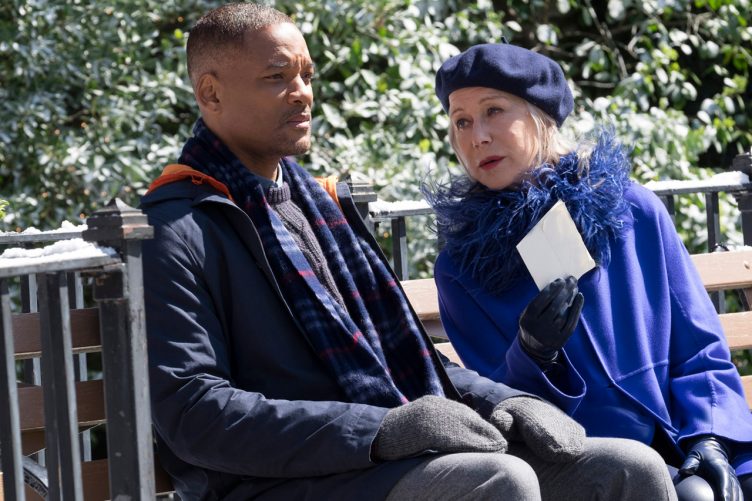 Desperation strikes the management of an advertising firm when their founder falls prey to perpetual grief in Collateral Beauty.
Desperation strikes the management of an advertising firm when their founder falls prey to perpetual grief in Collateral Beauty.
Howard (Will Smith) was once a vibrant, energetic, optimistic leader of the New York City advertising company that he created. It’s now a highly successful firm with a large staff and much larger clients. All of that effort starts to unravel after Howard loses a child and descends into a darkness from which he’s unable to escape. He shows up to work only as a matter of repetition and might as well not even bother. Once there, all that he can accomplish is setting up elaborate rows of dominoes to later knock down before repeating the entire process. His upper management team — Whit (Edward Norton), Claire (Kate Winslet) and Simon (Michael Peña) — are quickly running out of patience. They’ve failed at every attempt to engage their lost boss and friend. Their largest clients are now threatening to leave, and this will ultimately cost everyone their jobs. Drastic times call for drastic measures, and the only option open to the team is to have Howard deemed mentally unfit to continue running the company.
Here we have a film with a bounty of potential that’s wasted in the hands of a bad writer. Allan Loeb has 20 major credits to his name over a decade. The “highlights” include the last Adam Sandler film that anyone could possibly name (Just Go With It), the Wall Street sequel that almost no one saw (Wall Street: Money Never Sleeps) and 21, the film that turned an incredibly electric book into a widespread blackout.
The early strokes of the story are a masterpiece. It’s bold, original and amazingly captivating… until it suddenly isn’t. It had the makings of a perfect holiday film with the hilarity of Scrooged and the soft touch of It’s a Wonderful Life. It’s all mesmerizing until we realize where the film is actually heading instead of where everyone wants it to go. In an effort to cope, Howard writes desperate letters to Time, Love and Death. The team decides to hire actors to give those abstractions physical form and to answer Howard’s inquiries. That’s the stuff of magic. The scenes between Howard and his abstractions (played beautifully by Helen Mirren, Keira Knightley and Jacob Latimore) are priceless. That interaction and introspection is where the story should have remained. Let Howard heal through those endlessly engaging encounters.
Loeb instead takes us into insipid, poorly conceived territory with scenes that turn almost everyone into heartless monsters; introduce plot points that make no sense; and add an unwanted touch of the supernatural. The final nail in the writer’s coffin involves a supporting character with a story line that’s beyond believable. Whoever hires this guy next deserves the disaster that’s sure to follow. This is a film that left me absolutely incensed over what could have been and should have been. It’s worth watching right up to a big boardroom meeting. Once there, walk out. Whatever you imagine will be an improvement still worth the price of admission.



